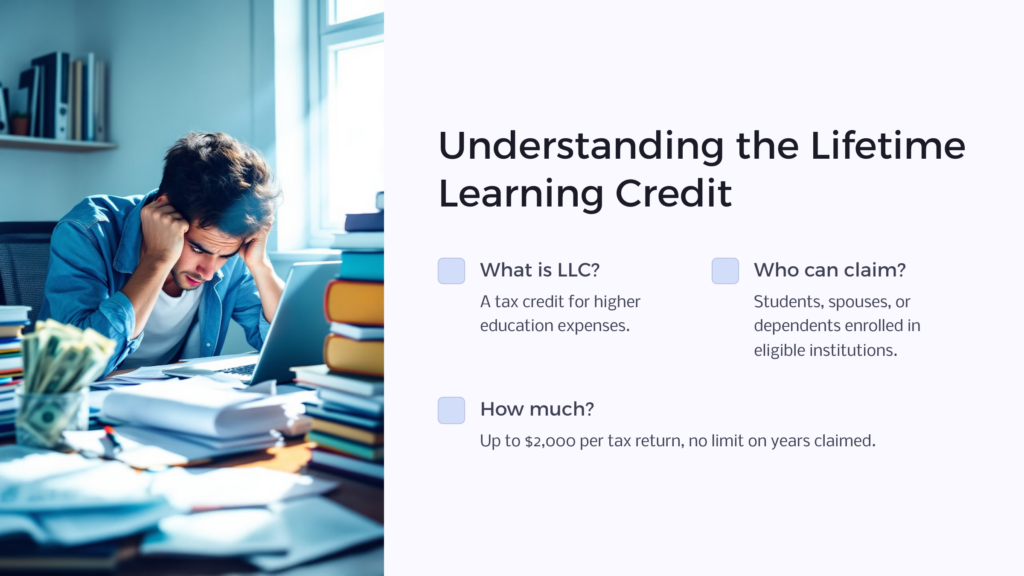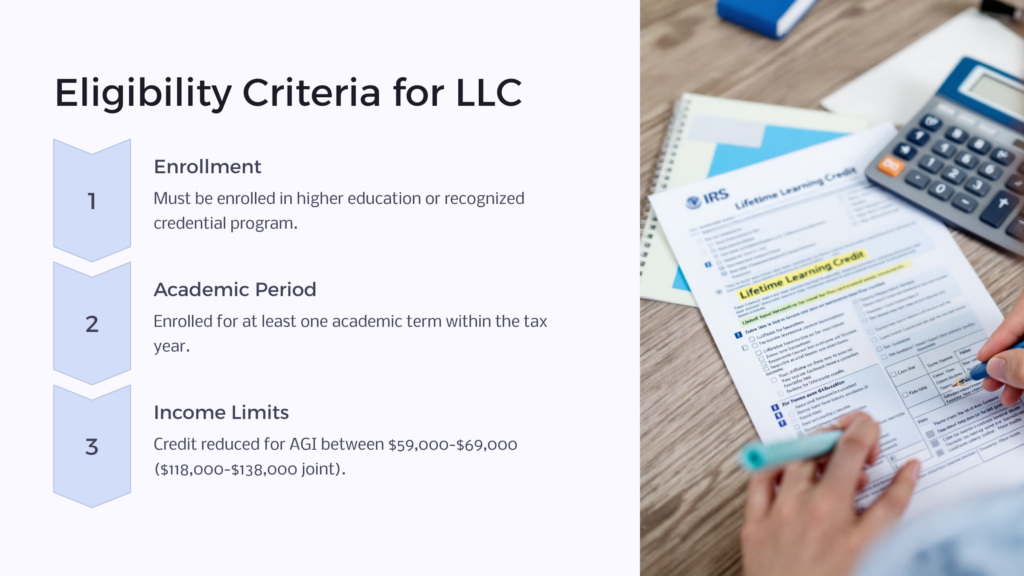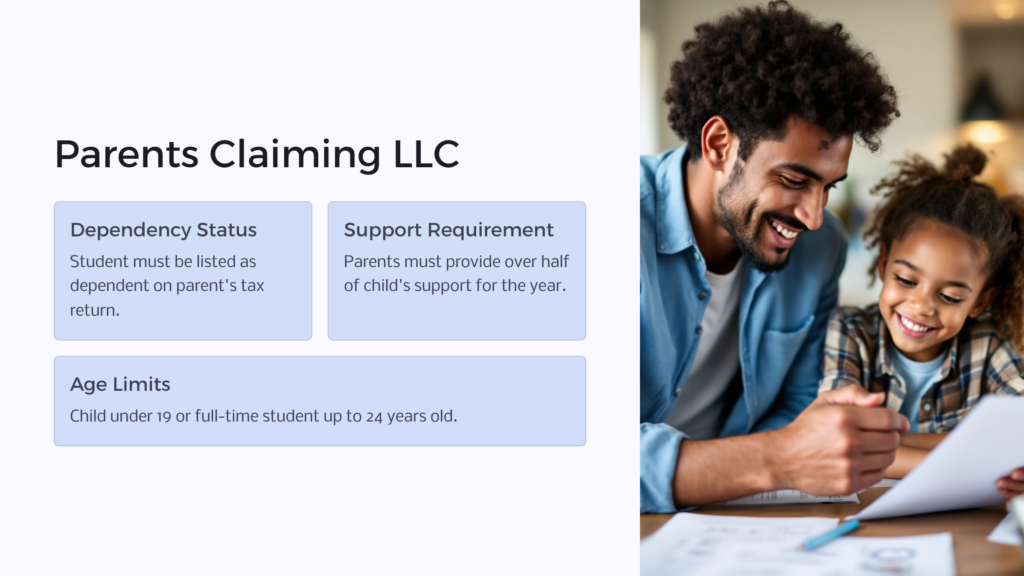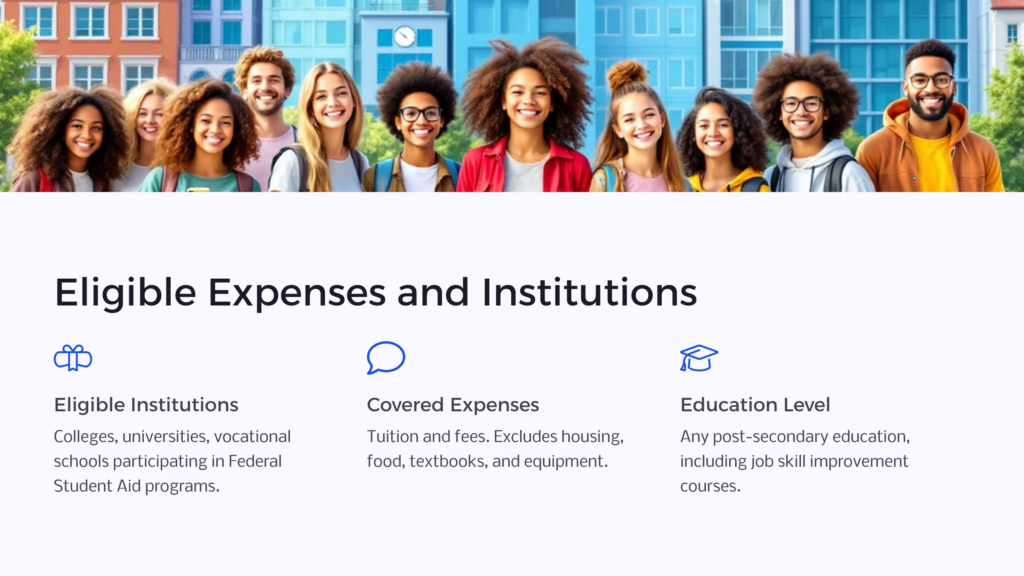Higher education is becoming more expensive every year, and hundreds of thousands of students go into debt trying to obtain a college degree. To help offset some college costs, it may be worth looking into the Lifetime Learning Tax Credit.
What is the Lifetime Learning Tax Credit?

Lifetime Learning Credit (LLC) is a tax credit designed to balance the related expenses of higher education. This credit is for students enrolled in an eligible education institution pursuing any form of higher education, including courses designed to improve job skills. A total of $2,000 in qualified higher education expenses can be taken as a tax deduction per return, with no limit to how many years you can claim LLC.
Who is LLC For?

To be eligible for Lifetime Learning Credit, you must either be the student, spouse of the student, or have the student be dependent on your tax return. The student must also be enrolled in higher education or a recognized education credential. Students must also be enrolled in at least one academic semester, trimester, or term within the tax year. Be aware that students may not be eligible if your adjusted gross income is between $59,000 and $69,000 ($118,000 and $138,000 if you file a joint return). Remember, qualified higher education expenses are gradually reduced according to your income, so partial credit is possible.
How Do You Claim LLC?
To claim Lifetime Learning Credit, you must obtain a form 1098-T from an eligible educational institution. Higher education institutions typically send this form to students by the end of January. In order to claim credit, you must enter the financial information on a form 8863 and attach it to your form 1040. Be sure the form is correct, or you will not receive any compensation or credit for tuition.
How Much is the LLC Worth?
The maximum Lifetime Learning Credit you can receive for your taxes is $2,000, which is twenty percent of the first $10,000 out-of-pocket expenses for that year. The LLC is non-refundable, meaning it only goes toward the taxes you owe, and you won’t receive any money from the leftover credit. Also, You cannot claim the American Opportunity Credit in the same year you claim the Lifetime Learning Credit. Check if you are eligible for the American Opportunity Credit, as it can be worth more than the LLC.
What is the Difference Between the LLC and the AOTC?
There are several differences between the Lifetime Learning Credit and the American Opportunity Credit. For example, the AOTC can potentially refund you more money for your expenses and is also refundable, whereas the LLC is not. Also, the limit for gross income is higher for the AOTC than the LLC. To claim the AOTC, students must pursue a degree in their first four years. It also can only be claimed for four years. To claim the LLC, students can pursue any higher education and can be claimed for any number of years. AOTC can also be used for textbooks, equipment, and supplies, while LLC cannot.
Can Parents Claim LLC?

Parents can claim LLC if the student is listed as their dependent on their tax return. However, this means the student cannot receive the tax credit. In addition, parents can only claim a student as their dependent if they supply more than half of the child’s support for the tax year, and the child is either under 19 or enrolled full-time up to 24 years of age.
What Related Expenses Does LLC Count as a Tax Deduction?
Most college costs can be credited with LLC, including tuition and fees. However, this does not cover housing, food, SAT or ACT fees, textbooks, or equipment. Check what expenses can be counted toward LLC when filing your tax return.
How Do I Know My School is Eligible for LLC?

An eligible educational institution is any college, university, vocational, or other post-secondary institution that offers higher education beyond high school. The school must be eligible to participate in the Federal Student Aid program run by the U.S. Department of Education. This typically includes all public, private, nonprofit, and accredited post-secondary educational institutions.
Can A Non-Resident Alien Claim LLC?
Generally, the answer is no. However, there are some exceptions. For example, they can claim LLC if they are married to a U.S. citizen and decide to file jointly, or they are a Dual-Status Alien and choose to be treated as a U.S. resident for the entire year.
Will VA Education Benefit Payments Affect my Tax Credit?
Yes. Some VA education tax benefits must be subtracted from your educational expenses. Any payments made directly to the school can go toward LLC, but any payments made directly to you or into your checking account (housing, for example) cannot be deducted from your taxes.
There are many tax benefits and credits someone can receive for all different walks of life.
 Benefits.com Advisors
Benefits.com Advisors
With expertise spanning local, state, and federal benefit programs, our team is dedicated to guiding individuals towards the perfect program tailored to their unique circumstances.
Rise to the top with Peak Benefits!
Join our Peak Benefits Newsletter for the latest news, resources, and offers on all things government benefits.





















